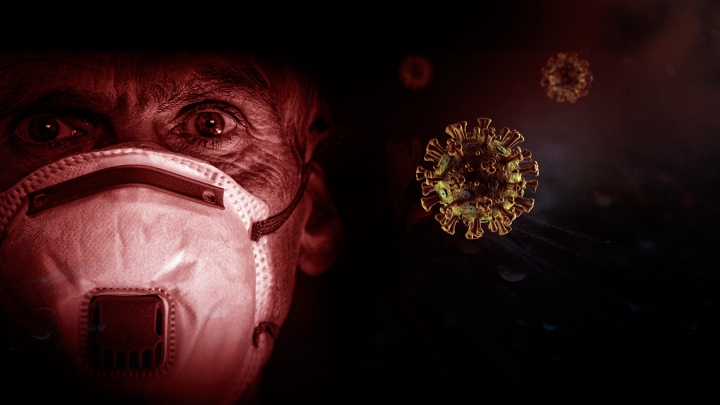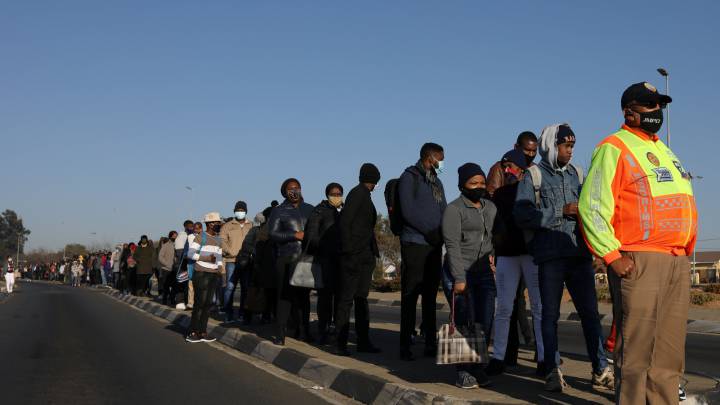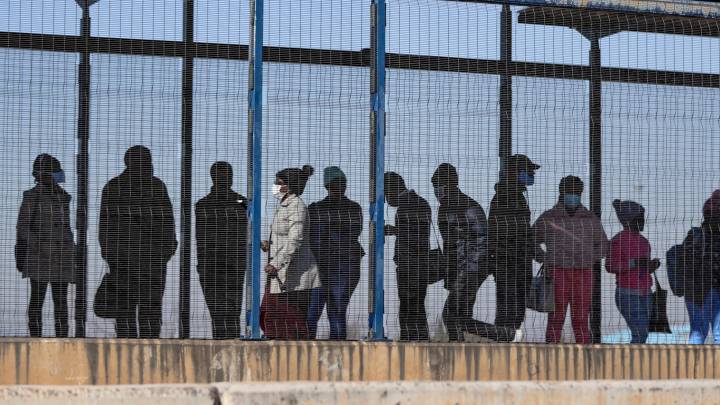Coronavirus Africa news summary: June 22
Updates on the Covid-19 pandemic in Africa: breaking news, updates and statistics as they emerge throughout the day.

Show key events only
Coronavirus live Africa: latest Covid-19 news - 22 June

Africa Covid-19 update: 07:00 WAT on Tuesday 23 June (08:00 CEST)
According to the latest figures published by Johns Hopkins University, 9,098,855 cases have been detected worldwide, with 472,172 deaths and 4,526,407 people have recovered.
South Africa: 101,590 cases / 1,991 deaths
Nigeria: 20,919 cases / 525 deaths
Ghana: 14,154 / 85 deaths
Coronavirus: the complete guide to the Covid-19 pandemic
Coronavirus: the complete guide to the Covid-19 pandemic
All the information you need to understand the coronavirus and ways to stay safe during the Covid-19 pandemic:
Namibia eases coronavirus restrictions
Namibia's president, Hage Geingob, has announced that the country will move from stage 3 to stage 4 of its reopening plan, despite registering 17 new cases of the coronavirus in the past 48 hours, Reuters said.
Coronavirus slowdown hits Ivory Coast's cotton sector
Ivory Coast's cotton industry will struggle to cover its costs after exporting just 20% of last season's 210,902 tonnes of fibre because of Covid-19 disruptions in top buying destinations in Asia, the cotton ginners' association told Reuters on Monday.
In a normal year, the West African nation would have exported almost all of its fibre by now. Instead, the crisis has caused delays and the cancellation of some contracts with buyers in Pakistan, India and Bangladesh, the association's executive secretary said.
Global cotton prices have fallen by more than 11% this year, after efforts to slow the spread of the coronavirus forced clothing shops to close, dented demand and accelerated a decline triggered by the U.S.-China trade war.
As a result, Ivory Coast's cotton sector "is facing difficulties mobilising funds to cover costs relating to the collection of fibre, transport and payment of producers," said Brou Kouakou, declining to provide figures.
The need to store stocks longer and extend loans as a result of coronavirus-linked delays has further increased costs, he said. (Reuters)
Worldwide cases top nine million
According to figures compiled by Johns Hopkins University the total worldwide confirmed cases of Covid-19 are now over nine million.
South Africa: taxi drivers on strike due to Covid-19 consequences
Taxi drivers not happy, commuters stranded

Wine worries
Assistant winemaker Maria Bosmann (51) pruning a vineyard at the Nabygelegen Winery in Wellington near Cape Town.
South Africa shuttered liquor stores at the start of the strict anti-coronavirus lockdown on 27 March and the controversial booze ban was in place until it was partially lifted on 1 June as part of a gradual easing of confinement measures to limit the economic setbacks of the pandemic.
Wine producers though in the valleys of South Africa's Western Cape province are concerned the industry will struggle to bounce back. The alcohol sales ban was coupled with a six-week export freeze, raising concern buyers could turn to suppliers in other countries is demands are not rapidly met.
Waiting for a surge in Covid-19 cases
CNN with an in-depth report on the situation in many African countries, where the initial fears were that Covid-19 would swiftly overwhelm health services. That didn't happen, but many fear the pandemic is still to wreak havoc across the continent. Why the initial surge didn't happen and whether it still will is one of the biggest questions facing African countries.
Several things appear to be important: initial good response from leaders, experience dealing with diseases such as ebola and yellow fever, socio-ecological factors, and the complex way humans and the environment interact.
Minibus drivers in South Africa strike over coronavirus funding
Drivers of minibus taxis in South Africa's financial hub Gauteng went on strike on Monday to demand more financial support from government, leaving thousands of commuters stranded.
Dozens of taxis blocked busy roads in Johannesburg and Pretoria, confronting police and soldiers. Many people were stuck at taxi ranks, while others walked to work or piled onto buses.
Since a coronavirus shutdown began in late March, taxis have been permitted to operate at only 70% capacity under strict social distancing measures, a difficult situation as the industry depends on maximum passenger loads at low prices.
The loss of income from smaller loads and lower volumes due the shutdown, which saw most workplaces completely closed, has caused unhappiness in the industry, with operators threatening price increases of more 100% in some areas to cover losses.
The lockdown has been gradually eased and most of the workforce are now allowed to go to work.
Nigerian doctors suspend strike over benefits to hold talks
Resident doctors in Nigerian public hospitals have suspended a strike they began last week in which they demanded better benefits, including the provision of more protective equipment, as they battle the coronavirus, the union said on Monday.
The National Association of Resident Doctors (NARD), launching the industrial action last Monday, said it would give the government two weeks to meet its demands or else those treating COVID-19 patients, who stayed on the job, would also walk out.
Resident doctors are those who have graduated from medical school and are training as specialist consultants. They are pivotal to frontline healthcare in Nigeria as they dominate the emergency wards in its hospitals.
The NARD has sought a COVID-19 pay supplement in addition to life insurance for doctors and more funds in the federal budget for their training, among other demands.
Ghanaian government criticized for its extravagant COVID-19 measures
Ghanaian government criticized for its extravagant COVID-19 measures
The Ghanaian government has been criticized for a recently-signed law which is aimed at containing the Coronavirus outspread in the country.
Coronavirus ‘breakthrough’ drug for SA explained
Health minister Dr Zweli Mkhize says that South Africa will use dexamethasone as a means of coronavirus treatment, but has warned that the drug should not be seen as a cure.
Herbal mix continues to gain traction
The use of ‘Agbo’, herbal concoction, has continued to gain grounds among some people in Lagos State as a preventive medicine against contracting coronavirus especially in Oshodi.
Antibody levels in recovered Covid-19 patients decline quickly
Levels of an antibody found in recovered Covid-19 patients fell sharply in 2-3 months after infection for both symptomatic and asymptomatic patients, according to a Chinese study, raising questions about the length of any immunity against the novel coronavirus.
The research, published in Nature Medicine on 18 June, highlights the risks of using Covid-19 'immunity passports' and supports the prolonged use of public health interventions such as social distancing and isolating high-risk groups, researchers said. Health authorities in some countries such as Germany are debating the ethics and practicalities of allowing people who test positive for antibodies to move more freely than others who don't.
The research, which studied 37 symptomatic patients and 37 asymptomatic patients, found that of those who tested positive for the presence of the IgG antibody, one of the main types of antibodies induced after infection, over 90% showed sharp declines in 2-3 months.
Elections in Uganda to go ahead in new form
Uganda’s Electoral Commission announced on Tuesday that it will push ahead with organising the scheduled February 2021 General Election.
“Given the Covid-19 pandemic, and health risks involved and the expectations during the electoral activities, preparations and conduct of these elections will take different modes,” said Justice Byabakama.
KAA money will last just six months
“The money that we currently have in our reserves can sustain us in the next six months, if there will be no meaningful recovery, then we might have to seek financing from the government,” said KAA acting managing director Alex Gitari during a Webinar organised by Airports Council International (ACI).

Commuters line up as they wait for the bus during a protest by taxi operators over the government's financial relief for the taxi industry, during the coronavirus disease lockdown, in Soweto, South Africa, 22 June 2020. (Reuters/Siphiwe Sibeko)
African Covid-19 increases
The tracking of virus spread across Africa is considered by the BBC's Sally Hayden.
Testing challenges in SA
'Within days of South Africa’s national coronavirus lockdown, our teams were in the field conducting large-scale Covid-19 screening and, to a lesser extent testing.
'Our experiences revealed that time-tested lessons from the fight against HIV about building community trust and battling misinformation are just as important in today’s Covid-19 response as they have been to us in the HIV field for the past two decades.'
African poaching increases during lockdown
Authorities in India are concerned this spike in poaching could kill not only endangered tigers and leopards but also species these carnivores depend upon to survive.
“It is risky to poach, but if pushed to the brink, some could think that these are risks worth taking,” said Mayukh Chatterjee, a wildlife biologist with the nonprofit Wildlife Trust of India.
Catch up
Here are some of the coronavirus-related stories that have been making the headlines over the past 24 hours...
- South Africa confirmed cases rise by nearly 5k
- Morocco to resume domestic flights starting 25 June
- Russian football game cancelled after two African players test postitive
- Egyptian high-school pupils, masked and gloved, head into exams
- New Development Bank provides South Africa with $1 billion coronavirus loan
- Morocco to resume domestic travel and services
Africa Covid-19 update: 07:00 WAT on Monday 22 June (08:00 CEST)
According to the latest figures published by Johns Hopkins University, 8,952,428 cases have been detected worldwide, with 468,331 deaths and 4,434,641 people have recovered.
South Africa: 97,302 cases / 1,930 deaths
Nigeria: 20,244 cases / 518 deaths
Ghana: 14,154 / 58 deaths
Coronavirus Africa live updates: welcome
Good morning and welcome to our live, Africa-focused coverage of the coronavirus pandemic, which has now registered over 8.9 million cases worldwide.


